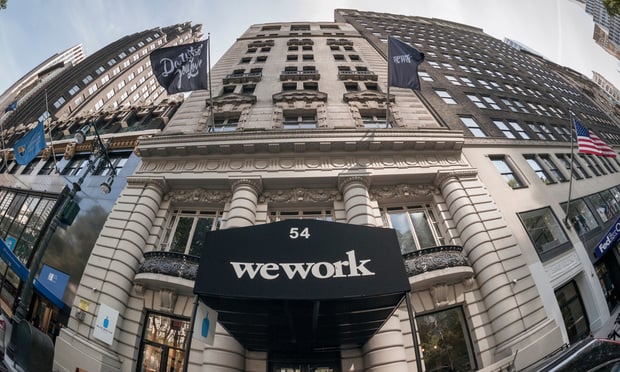Products You May Like
My business partner’s friend recently needed a place to work with WiFi for a few hours in Midtown Manhattan. She saw a WeWork building, wandered in, found a work space, and did what she had to do. Nobody bothered her as other itinerants shuffled in and out. She thought about grabbing a free beer in the socializing area on her way out, but reconsidered since she was freeloading as it was.
Besides the cratering retail sector sending overall core real estate returns to anemic levels, there are other cautionary signs that should give investors pause. In particular, they might also prepare for a period of uncertainty in the office sector.
The normally volatile high-tech markets offer a good barometer for what may be coming. Fueled by private equity and the prospect of lucrative IPOs, various unicorns have expanded space requirements and paid sometimes exorbitant rents despite never remotely turning profits. WeWork, the global shared space provider and largest space user in New York City, is the current poster child for overreach. Exposed shortcomings of other recent digital-age high flyers like Uber and Lyft, meanwhile, have turned off Wall Street and at least temporarily chilled interest in funding start-ups.
With funding spigots shutting off many of these businesses may need to cut costs or at least curtail expansions. Wannabe startups will have trouble getting off the ground. And some recent entrants could suddenly close down and vacate space. Landlords who signed up these companies based on potential rather than credit histories could suffer.
We’ve seen this act before—it’s often a harbinger to escalating bad news. It happened in the mid-1980s, 2000 and 2008. Venture capital gets excited taking stakes in what they hope can be the next coming of Amazon or Microsoft. Flush with cash infusions, the companies inflate their brands partly by renting out fancy digs in expensive markets. Real estate owners are willing to take a chance on leasing to them based on all the hype. And just like that reality can strike.
WeWork is a special case since its model is based around providing office space to the surfeit of freelancers and contract workers increasingly preferred by companies cutting costs and enabled by work-from-anywhere internet technology. Many small businesses and sole proprietors want or need the fiction of working at a corporate address. Others seek the interpersonal connections and need the discipline of working around others in an office environment. At WeWork, the weekly wine and cheese parties and expensive fitouts were indicative of how the company ramped up expenses in a free spending wave to help attract tenants. Now what happens when the experience is compromised by cost cutting and retrenchment—so much for the social hours?
Increasingly more people will figure out that working from home is a more efficient and profitable alternative. All that overhead can go into their pockets. And when an inevitable recession hits, eliminating rent when you don’t have to pay it will be the way to go. The shared services WeWork concept is not doomed by any means, but its growth track like office use in general will be compromised by the overarching paradigm shift—we can work from anywhere and office space isn’t as necessary as it used to be.
So where should real estate investors be wary of venture capital retrenchment? The San Francisco area, always a favored real estate market, is also historically one of the most volatile, because of significant high tech/R&D exposure. Look for early signs of problems there as well as in Portland, Seattle, Southern California, Boston, certain New York City submarkets, the DC suburbs, Austin and anywhere else where high tech clusters. These markets inevitably bounce back, but overleveraged landlords and their lenders can get caught in the meantime. Retail owners may have some company soon.
The views expressed here are the author’s own and not those of ALM’s real estate media group.
